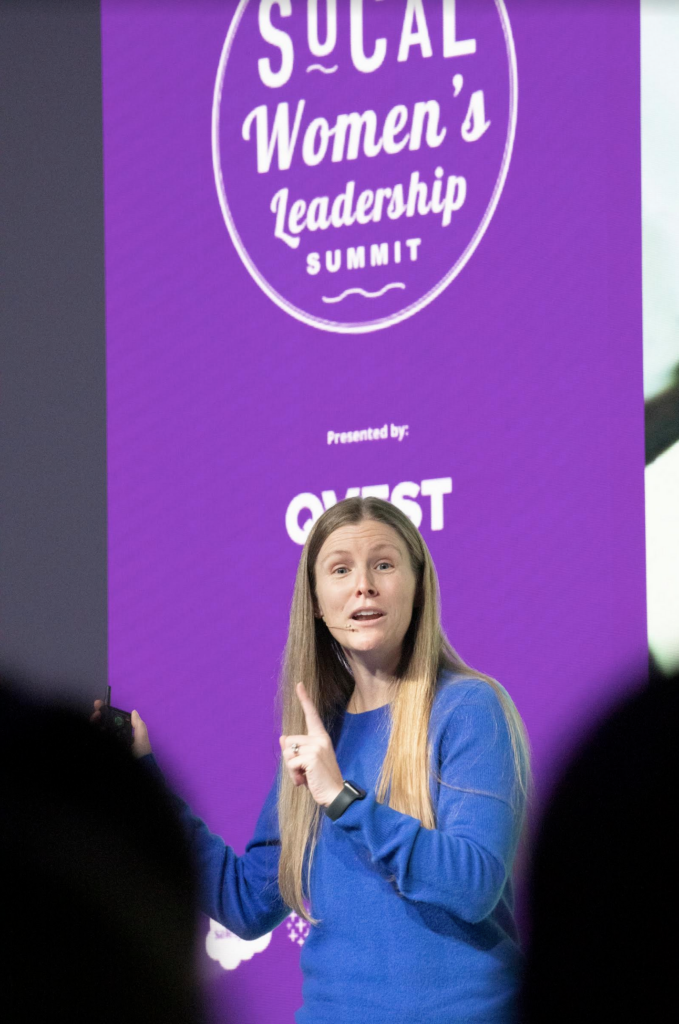M+E Daily

Sony Pictures CIO Explores the Importance of Courage
Story Highlights
Attendees at the Nov. 3 Women in Technology Hollywood’s (WiTH) SoCal Women’s Leadership Summit, at Nya Studios in Los Angeles, were provided with tips on how they can step into their full potential as leaders.
During the afternoon keynote “Elevate your Leadership with Courage and Conviction,” Kelly Hamilton, CIO of Sony Pictures Entertainment, aimed to inspire and empower attendees serving and looking to serve in leadership roles.
 With a proven track record of leadership in the tech and entertainment industry, Hamilton explained how courage and conviction can drive innovation, break down barriers and shatter glass ceilings.
With a proven track record of leadership in the tech and entertainment industry, Hamilton explained how courage and conviction can drive innovation, break down barriers and shatter glass ceilings.
“When you don’t have any fear, it doesn’t actually take a lot of courage to do much of anything,” she said during her presentation. “If I’m not scared of something, then I don’t need to be courageous.”
There are three key elements in “courageous leadership,” she said, explaining: “First is accepting failure. If you don’t take risks, you probably won’t ever fail but you probably won’t ever succeed either.”
She recalled that, when she was in high school, she wasn’t athletic “but I wanted to be part of a team.”
She has an older sister who was one of the varsity tennis players and Hamilton decided to try out for the tennis team also.
“There were 31 of us who tried out for the tennis team that year. And I showed up on time every day after school. And I went, and I served, and I did make it over the net most of the time. And I would occasionally volley back. And, at the end of the week on Friday, when they posted” the names of those who made the team, there were 30 names on that list. Except one.”
She added: “Sure, I could have been despondent. And let’s be honest. I’m sure one-year old me was pretty bummed out. My mom did her fair share of work at this point. So, what’d I do? Well, tried out for the water polo team. You won’t be surprised to hear I did not play on the water polo team. I then tried out for the basketball team.”
Hamilton joked: “You’re going to notice a theme here.”
But she noted: “While I am not athletic, I do have some semblance of rhythm and I can be loud. So, I was a cheerleader. And I found a spot. The important thing in that is it would have been really easy for me to take that first failure and pack my bag and go home. I didn’t. I maintained a sense of resilience. I looked at the bright side. I learned I’m not a good tennis player. Nor volleyball. Water polo. Basketball. Soccer…. I also learned that, actually, failing wasn’t that bad. I mean, it wasn’t devastating. My life wasn’t over. I still had friends. People still talked to me. I didn’t sit by myself at a lunch table. It was OK.”
A man (or woman) has got to ‘Know his limitations’
Hamilton moved on to what she called the “next important part of courageous leadership: It’s humility. It’s knowing your limits. It’s knowing where you can reach. It’s not a bad thing to admit you’re not good at something. I cannot write code very well. At all, in fact.”
She added: “I have a deep appreciation of where my limits are. What can I do? Where am I excellent? Where am I serviceable? And where do I have massive blind spots? And I have them. I know I have them. We all have them…. [There is] something I’ve told myself for many years that has always given me great solace and strength. And it is the idea that perfection is unattainable … . Some people think of that, and they think that’s like a downer. I don’t. I think it’s a wonderful thing. Because it does two things for me. Well, if perfection isn’t attainable, I’m not supposed to be perfect. I’m supposed to be flawed. Because that’s what it means to be a human. We are all imperfect. But it also means no matter how great I get … I could always be better.”
Another important thing for leaders is to be good at handling change, she went on to say.
“What am I good at? Change. And my predecessor, who was excellent in many ways, had been in the role for over a decade. And so, in some ways, the thing the team needed most was some change. A different perspective, a new way to look at things.”
Also key, she said, was the team needed to be trusted, adding: “Here’s the funny thing about trust. When you know you can’t do it, you have to trust those who can. I can’t code. I can’t come and micromanage.”
She conceded that she doesn’t trust her eight- and nine-year-old kids to drive her family’s car.
“I do not trust them with the keys to the car because that would be unintelligent,” she said. “They would get in, they’d slam on the gas, they’d drive through the garage door. It would be miserable for all of us. They have not demonstrated themselves” to be able to drive yet, she noted.
When, on the other hand, a kid has “demonstrated enough competence … in similar moments that you can deliver the right results, you’ve demonstrated you have integrity” and when you say you will stay at or under the speed limit, “then I know you’ll keep your word,” she noted.
“That’s intelligent trust and that is, as a leader, what you need to be looking for,” she told attendees and those viewing the keynote remotely. “Who is this person that’s on your team, that’s in your environment, that you’ve got to lean on, and what can you reasonably trust them to be able to do or not? It’s not all or nothing. And you can grow that trust over time.”
A parting question
“I want to leave you with a question to take back to yourselves, to the people you work with, to maybe the women you mentor,” Hamilton went on to say: “How are you leading them and how are you allowing them to lead you to help you to bring out the greatness in yourself, and to bring out the greatness in them and the teams you’re working with. Because that’s actually the leader most of our organizations need these days. They don’t need someone who’s yelling at them and telling them what to do and micromanaging every step of what they’re doing along the way.”
After all, she concluded: “No one’s happy when we do that to them. We’re not happy when it’s done to us. So, if you really think about … where can you take a risk, maybe you’re taking a risk on a person. Maybe that’s the risk. And it may not pay off because that person’s probably imperfect. But how do you think about using your intelligence to know where could you trust someone to stretch them, to give them an opportunity? Where can you trust yourself to take that risk, knowing there’s a chance of failure?”
 The annual SoCal Women’s Leadership Summit was presented by Qvest with sponsorship by Softtek, and took place at Nya Studios, located in the heart of Hollywood.
The annual SoCal Women’s Leadership Summit was presented by Qvest with sponsorship by Softtek, and took place at Nya Studios, located in the heart of Hollywood.
The full-day event, themed “Us, Our Org, Our Community,” offered a dynamic lineup of presentations and discussions.
WiTH, founded in 2014, plays a pivotal role in advancing women in entertainment technology.
The WiTH Steering Committee, responsible for selecting Leadership Awards winners, comprises representatives from prominent organizations such as Amazon Studios, Microsoft, Lionsgate, NBCUniversal, Paramount, Sony Pictures Entertainment, and The Walt Disney Company.









